Autumn Conference Amsterdam 2017: presentation summaries
Adapt and adopt: bold investments for a new world
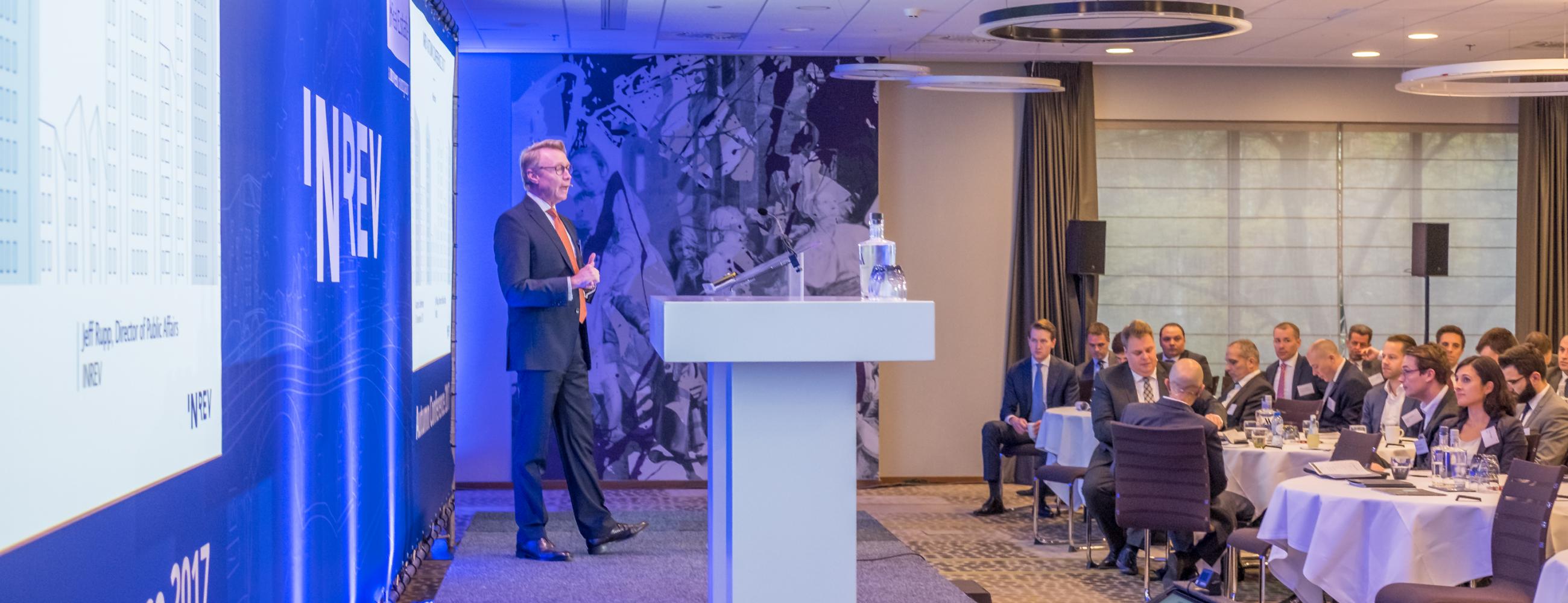
It was a full house in Amsterdam at the second annual INREV Autumn Conference. Over 170 delegates attended, including more than 30 institutional investors.
Joe Valente, JP Morgan Asset Management, moderated the conference under the theme adapt and adopt: bold investments for a new world; and everyone in the room was engaged in the conversation.
The big themes of the day were the shift from ownership to service, the impact of an ageing population, how we can future-proof our industry, and discovering tipping points rather than trends – if a trend becomes obvious, it’s already too late.
Use the left hand navigation to view summaries.
Future watching: the mega trends set to shape the world
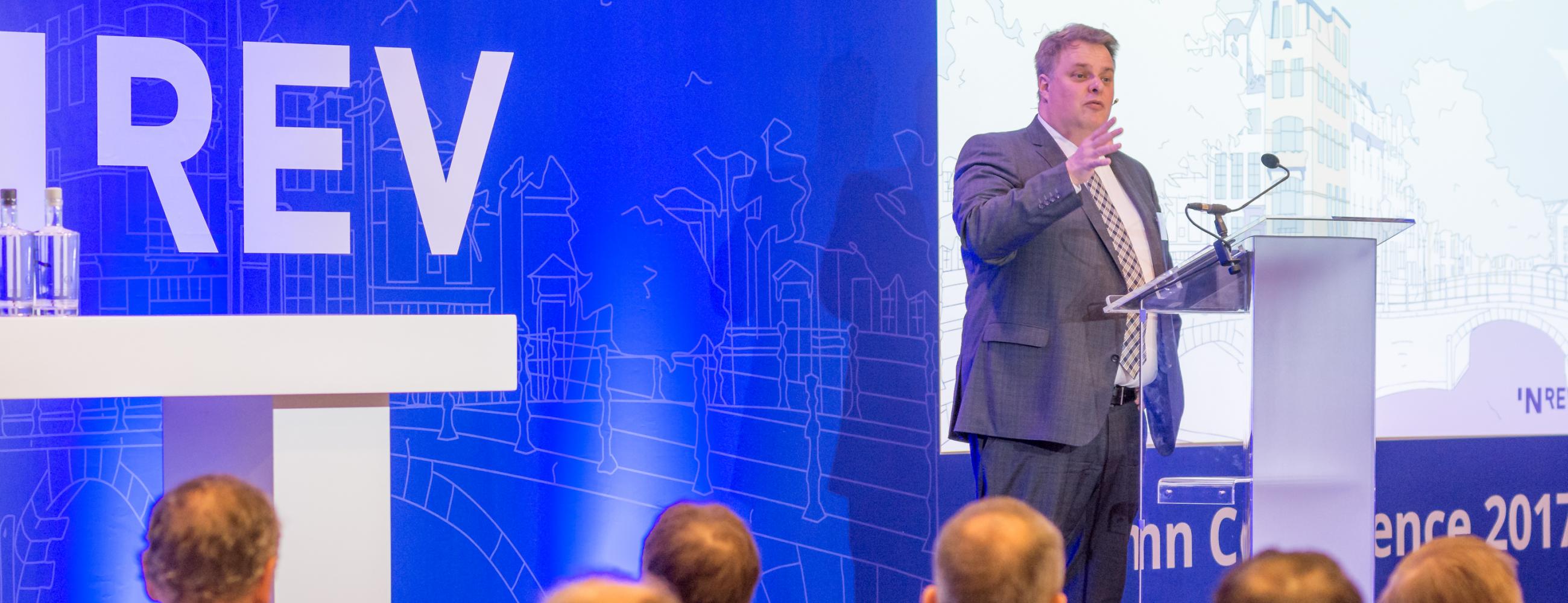
The conference opened with a keynote by Lars Thomsen, Future Matters, who challenged the audience to predict the tipping points – paradigm shifts – that will occur in the next 10 years, and how they will impact real estate. The audience voted: 55% of delegates thought that technology will have the most impact on the future of real estate, followed by migration at 18%.
Lars described four potential tipping points that could redefine how we use space. The first is the ‘end of dumbness’ – at least system dumbness. Systems will be able to learn from each other and how people use their surroundings via artificial intelligence. This will occur first by collecting data through the digital nervous system: the internet of things. Then, through artificial intelligence, pattern recognition will emerge. And finally technology will be able to heal itself. An example is smart thermostats: first the device collects information about user behaviour, then it maps patterns, and finally it predicts behaviour.
The second tipping point could happen in as little as 5 years, when Lars predicts that humanoid robots with legs, skin and senses will cost less than €20,000. By 2027 he expects the robotics industry will be larger than the car market. The third tipping point may be mobility as a service (MaaS) – the Spotify of transportation -- replacing car ownership. And the fourth, the demographic trend of ageing and its impact on work. There will be a scarcity of talent, and companies will move to the cities where the talent wants to live. And real estate has a strong connection with the attractiveness of the city itself.
With disruption comes opportunity. Lars sees technology as a driver that enables people to do new things. ‘You need to design your products and services to adapt to these tipping points. Dream big, and calculate it to see if it will work.’
The age-old problem: adapting real estate to the new demographics
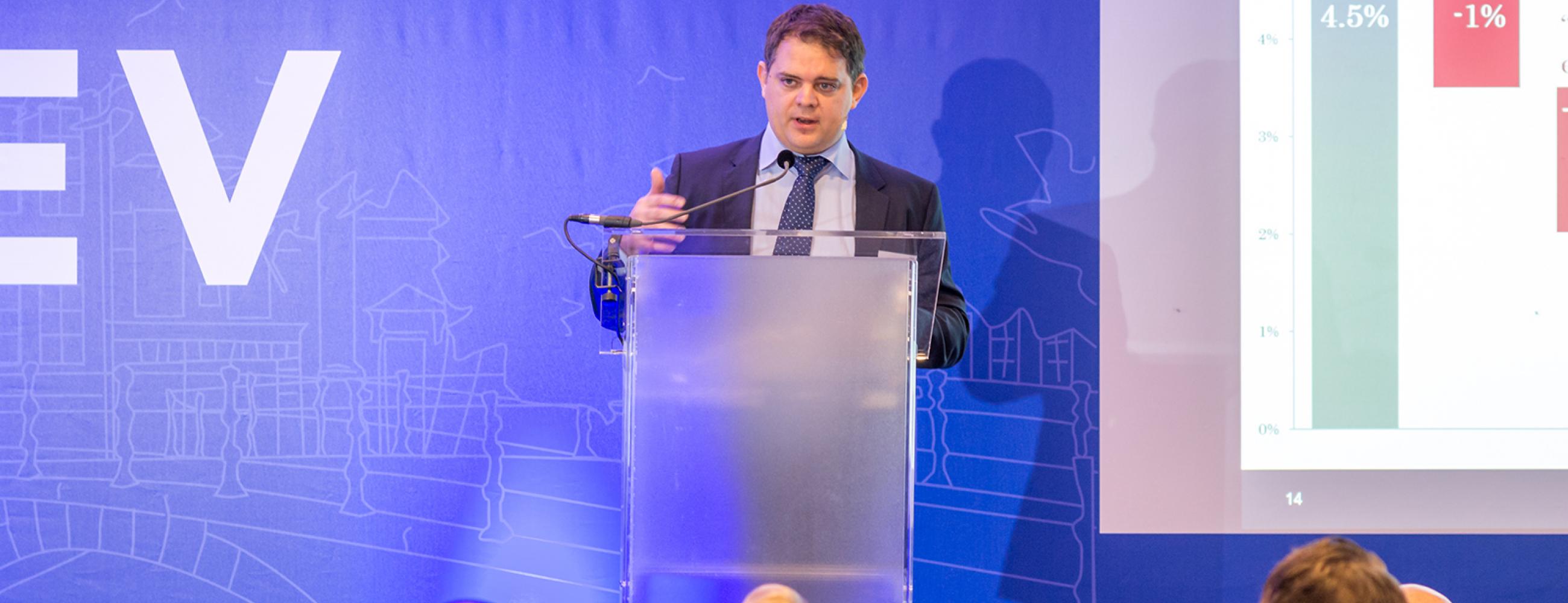
Populations are ageing rapidly, particularly in advanced economies. Graham Parry, Grosvenor Europe, highlighted the profound impacts this will have on the way we work and live and on our industry.
According to Graham, the two biggest impacts on growth are demographics and technology. The demographics currently point to slow growth, with an unprecedented number of retirees. He referred to the fiscal time bomb, where age-related expenditure (pensions and health) will go up to 8% of GDP with only two workers for every pensioner by 2045, compared to 8 workers for every pensioner in 1950. But with life expectancy increasing we are already seeing changes to how we live our lives which may improve productivity.
Other ways our productivity can grow is via immigration, getting the most out of older workers and technology. And up until now, there is no evidence that technology increases productivity (but it may finally be around the corner).
According to Graham, the impact on real estate will be a low return world, with a strong relationship between number of old people and declining house prices. To avoid this trend, investors may turn to emerging markets but this carries higher risks. Rather he suggests to adapt and build the right products. Baby boomers will be the richest generation to ever retire. He suggests to attract affluent silver consumers, and shift focus from first-time buyers to last-time buyers.
Staying up: managing business risks at the new frontier
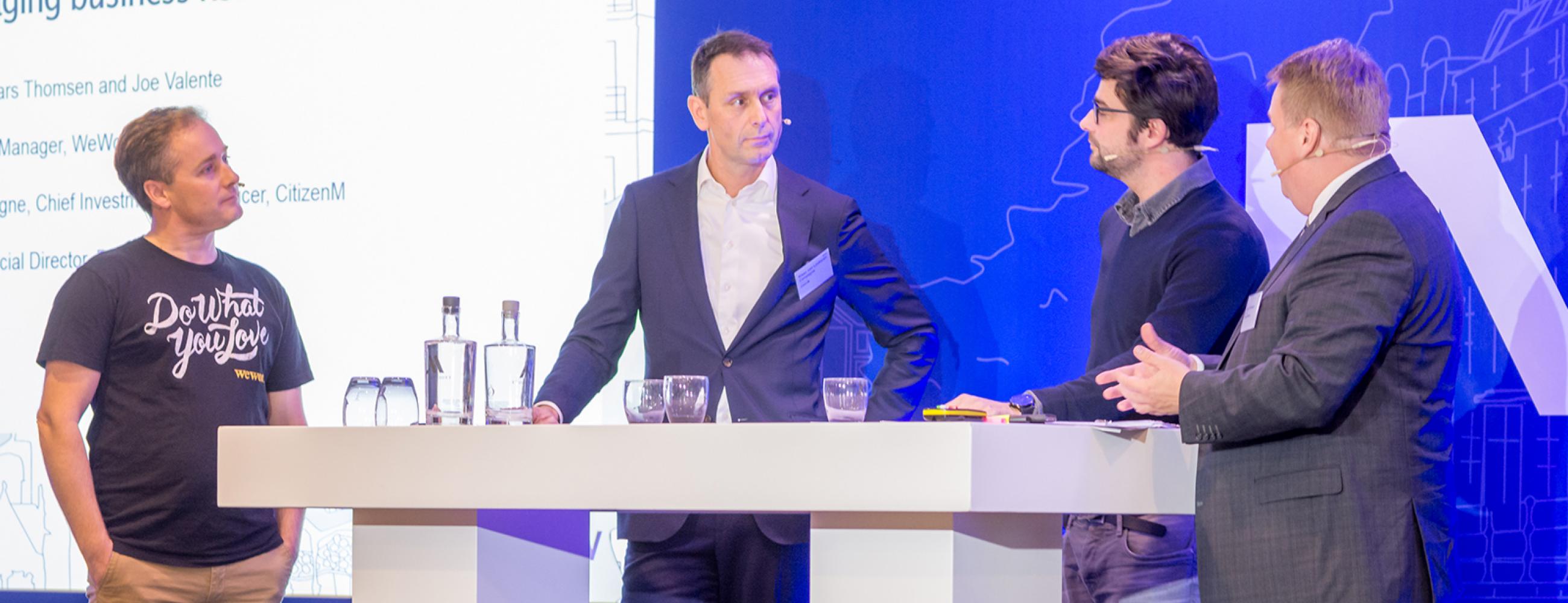
Three startups, WeWork, ParkBee and CitizenM presented their experiences on how to build a new business based on a megatrend, which was followed by an energetic discussion with Lars Thomsen and the audience.
The oldest of the three companies was only 10 years old, while the youngest was only 18 months. Each of the companies have applied a service layer to real estate, and each have used technology and data to optimise the use of space.
Wybo Wijnbergen described how WeWork (8 years old) meets the community, urbanisation and sharing wishes of millennials, while providing the office space flexibility that startups and growing enterprise companies need.
Klaas van Lookeren Campagne outlined CitizenM (10 years old)’s strategy for riding mega trends in the hotel industry. Rather than diversifying their offering, their reaction to the global financial crisis was to focus themselves into key cities and have the discipline to stick to their brand.
Wouter de Bruijne explained how ParkBee (18 months old) solves the urban parking problem by matching drivers with under-utilised privately owned parking spots, declaring that there are in fact enough parking spots available in city centres. Their company is 1/3 developers and programmers, and they are looking into new ways of using parking spaces such as electric charging stations, package pickup, space for uber drivers near airports, bike sharing, big data and providing for the space and service needs of autonomous cars.
On the subject of risk, the audience noted that each of the companies had emerged in response to the global financial crisis, but how were they protecting themselves from the next downturn? They all pointed to the flexible nature of their businesses – in a downturn, companies and people turn to shorter leases and need more flexible uses of space.
They also agreed that brand is a weakness in the real estate industry, and that as an industry it’s very far from its users. All of their businesses took advantage of this gap.
Rise of the new alternatives
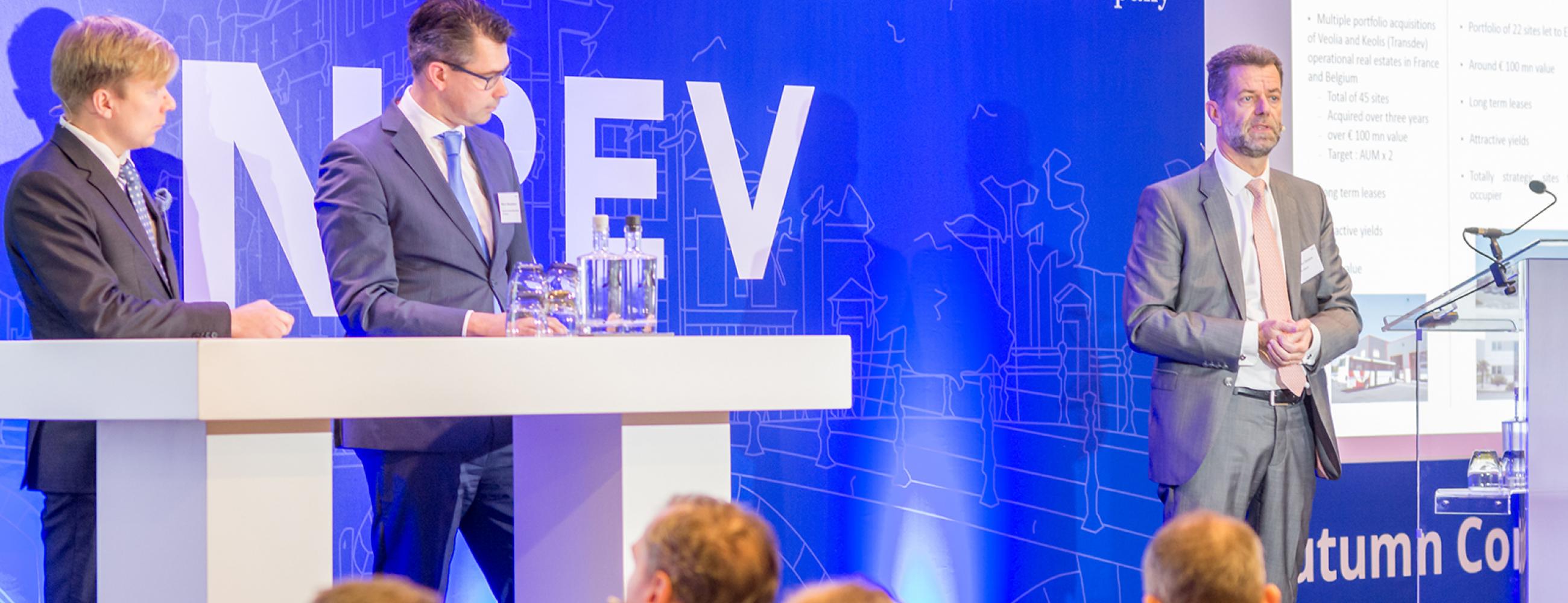
In our industry, we see a continued push into alternative real estate products and markets. Three senior industry experts presented their strategies and opportunities to be watched in the alternative space. Most delegates voted that senior living (52%) will see the most growth over the next 5 years, followed by healthcare (16%), student accommodation (13%), hotels (10%), leisure (7%) and other (1.5%).
Christian Delaire, Fonciere Atland, opened the conversation with a presentation on some of the ‘other’ alternative investments. His team is investing in bus facilities, infrastructure, industrial cleaning facilities, and specialised industrial facilities.
Johannes Kangas, Forenom, presented on serviced apartments with a focus on corporate accounts. He expects that a new trend for serviced spaces where you can sleep at night and fold away the bed to have an office during the day will grow, essentially combining the offers of CitizenM and WeWork.
Marco Mosselman, Syntrus Achmea Real Estate & Finance, presented on the growing market of health care real estate. He emphasised that health care is more independent from real estate markets than other sectors. Within health care, there are different options, such as lifetime homes, primary care residences, and academic hospitals.
The audience wanted to understand more about returns and risks, as alternative occupiers can have more difficulty in changing uses (especially industrial cleaning facilities, and health facilities).
Future-proofing: investing in the mega trends
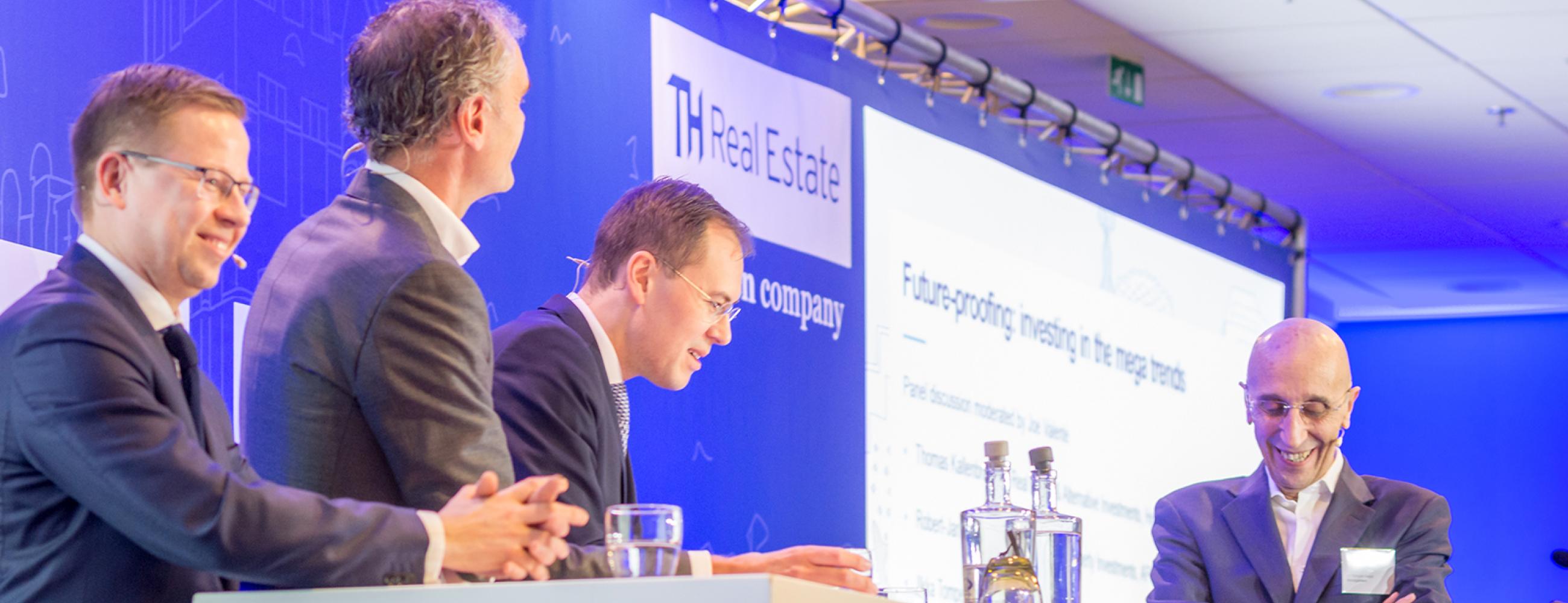
In this lively investor panel, participants discussed which trends will have the biggest impact on our industry and how we can future-proof our investments.
The conversation began with an omission from Thomas Kallenbrunnen, Helaba, that he may prove to be ‘the stupid person in the room’ because by attempting to de-risk investments (specifically, providing long-term leases to startups), you miss the potential returns that come with risk. Most of the panel agreed that by partnering with startups, investors can see the best ratio of risk and return in this changing climate.
The panel discussed if real estate as a service is the game to be played – you need to decide if you are an allocator or an operator and the partnership between these two roles is instrumental to its success.
Life on the edge: economic prospects in an unstable world
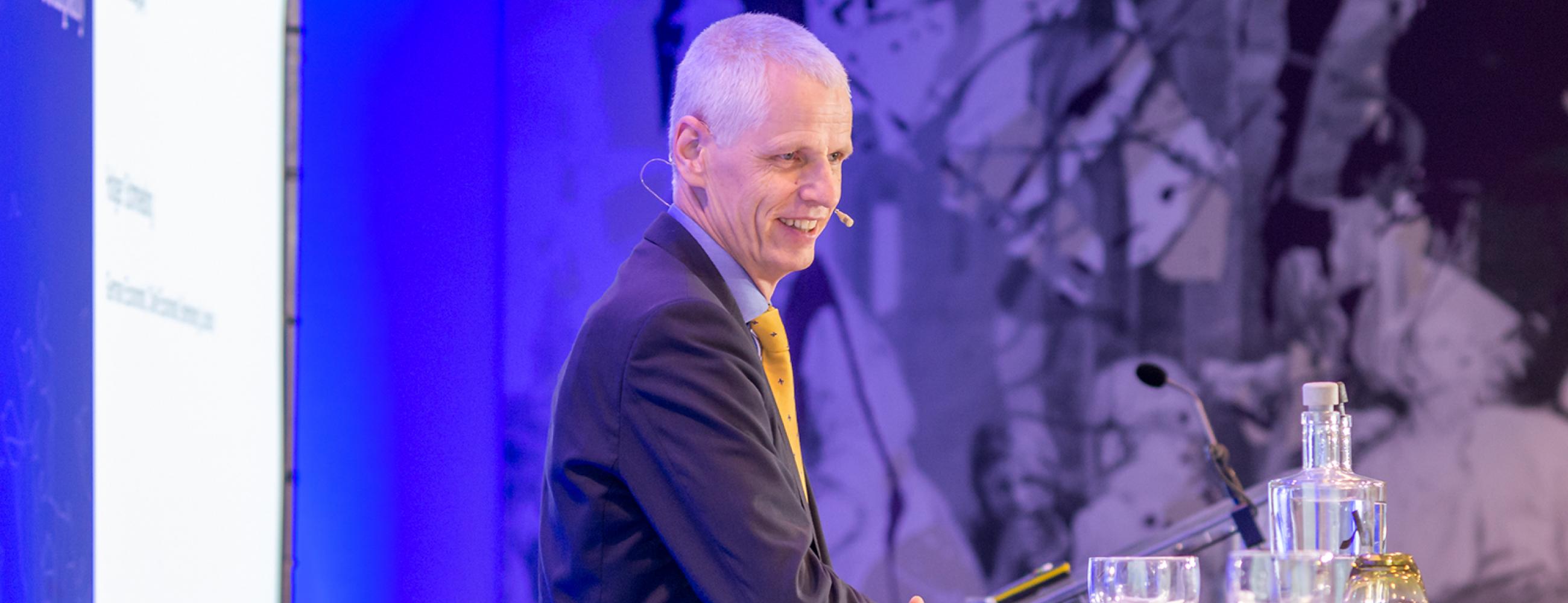
The conference wrapped up with an economic and political view from Holger Schmieding, Berenberg, who described the end of the current age of caution.
The western world is accelerating after many years of low borrowing. Holger expects 1-2 good years before Europe starts to cool down, and thinks the next cooldown will likely be caused by a decline in the US or possibly in China. He thinks the disruptive rise of China is largely over, and that China’s continued growth will be a two-way street.
He also believes the worst is over for populism in Europe. But with longer-term trends such as immigration and technology, we cannot be sure that the political climate will remain stable.